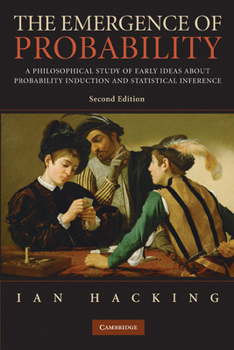The Emergence of Probability: A Philosophical Study of Early Ideas about Probability, Induction and Statistical Inference
Select Format
Select Condition 
Book Overview
Historical records show that there was no real concept of probability in Europe before the mid-seventeenth century, although the use of dice and other randomizing objects was commonplace. Ian Hacking... This description may be from another edition of this product.
Format:Paperback
Language:English
ISBN:0521685575
ISBN13:9780521685573
Release Date:July 2006
Publisher:Cambridge University Press
Length:246 Pages
Weight:0.78 lbs.
Dimensions:0.7" x 6.0" x 9.0"
Customer Reviews
2 ratings
Another Very Interesting Hacking Book; 4.5 stars
Published by Thriftbooks.com User , 15 years ago
Another very interesting book by Ian Hacking. This extended essay is an ambitious combination of general intellectual history, specific history of probability theory, and some reflections on the philosophical implications of these ideas and how they developed. Ideas of probability were essentially a new development in human thought, emerging only in the 17th century. Hacking begins with several chapters on the background changes that made the emergence of probability theory possible. Probabilistic thinking is made possible by the profound intellectual changes that form the foundation of the Scientific Revolution of the 17th century, including new ideas about evidence and causation. These ideas emerge from abandonment of the emphasis on Aristotlein deductive approaches to knowledge and acceptance of more empirical approaches emerging from the "low" sciences of medicine and alchemy. Against this background, several important figures like Pascal, Leibniz, and Bernoulli begin to develop more probability ideas. Hacking is very good on the immediate and philosophical concerns that drove these investigations. For Pascal, for instance, the development of his contribution to probability and decision theory was bound up in his Jansenist theological preoccupations. Hacking traces the development of these ideas, often with interesting reference to 20th century discussions of probabilistic thought with a minimum of technical language and a wide range of knowledge of this topic. He shows how a number of factors, for example, the need for Dutch provinces to develop profitable ways of selling annuities, contributed to the develop of probabilistic thinking. He concludes with a very interesting and surprising observation about one of the philosophical consequences of the emergence of probability, that it made it possible for Hume to pose the skeptical problem of induction. A really stimulating book.
excellent historical account of probability theory at its infancy
Published by Thriftbooks.com User , 16 years ago
This is the second edition of a book originally published in 1975. The main addition seems to be a large chapter-like section titled "Introduction 2006: The Archaeology of probable reasoning" that puts the work in contect with the thinking, research and publications from 1975-2006 that relate to the topic of the book. The main premise of the book is that although probabilistic ideas may have been around before 1670 and the detailed mathematical theory of probability and statistics occurred in the 20th century, the original work of men such as Pascal, Liebniz, Laplace, De Moivre, Huygens, and Jacques Bernoulli from around 1670 to the early 1700s really mark the emergence of probability as a discipline and the development of mathematical results that spawned the development of various theories of probability that came about in the 20th Century. This book is not a technical book and the specific mathematics that is covered is fairly easy for the layperson to understand. The key Idea is that in the work of Pascal and others dual concepts of probability emerged and the distinctions between the two concepts were not clearly delineated at the time. In a very historical account (much like the works of Porter and Stigler)that is also very philosophical in nature hacking points to the two concepts of probability. One is based solely on relative frequencies of occurrences based on empirical data. This led to the development in the 20th century of the work by Richard von Mises and A. N. Kolmogorov. The second concept is based on degrees of belief and led shortly to the work of Thomas Bayes and in the 20th century, Bruno De Finetti, Harold Jeffreys and L. J. Savage in what became known as the Bayesian or subjectivist school of probability and statistical inference. Hacking refers to the frequentist approach as aleatory probability and the Bayesian approach as epistemic probability. Hacking sees more than two schools of probability, induction and statistical inference. It is Hacking's contention that the emergence of probability can be attributed precisely to the time about 1670 when the work of Pascal first came out. He sees this strong development as the result of the need for probability in several areas. The earliest was games of chance. But it was only because of issues in the law, theology, economics, physics, atronomy and other sciences that the need led to the field flourishing with the top minds of the 17th and 18th centuries addressing the philosphical and mathematical issues. Included were Newton, Liebniz, Pascal, De Moivre, Laplace, Huygens and Bernoulli. As a professional statistician I found it interesting to learn how the works of the late 1600s and early 1700s influenced probability and statistics as it developed in the 20th century. Some of this work was familiar to me but much of it was not. For example, I found it interesting to learn that the "first" theorem in probability wsa Jacques Benoulli's proof of the weak law of la





